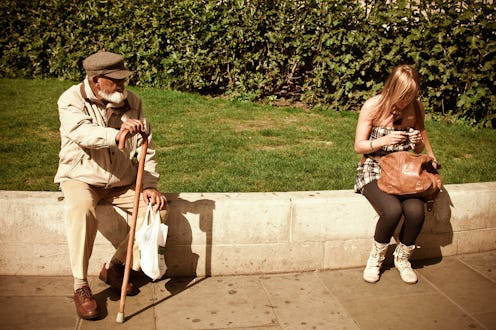Life
Did Men Create Menopause?

According to a new study from Canada’s McMaster University, the answer is yes: Blame it on the guys. A team of evolutionary geneticists is suggesting men's preference for younger mates made fertility pointless for older women. But in a classic chicken-or-egg dilemma, other scientists deny this claim, arguing that men turned to younger women precisely because of older women’s lower fertility.
Behind this new study lies a question researchers have been trying to answer for years: Why do women go through menopause? Humans are one of the few species to go through the transformation—whales can give birth in their 80s, elephants in their 60s. The only other beings to go through menopause are some whales and captive chimpanzees.
"There is evidence in human history; there was always a preference for younger women," professor Rama Singh, who led the study, explained to the BBC. Singh and his team fail to give an explanation for men's sexual preference. It might seem like an obvious answer to us as the fight against wrinkles and gravity continues, but this youth-lust could also be mostly a cultural phenomenon, since many species tend to mate primarily with older females.
A few years ago, evolutionary biologists Michael Cant from the University of Exeter and Rufus Johnstone from the University of Cambridge used game theory as an argument for the existence of menopause. Within most species, younger females assist the older reproducing females. So why don't humans fit the mold? Chalk it up to intergenerational conflict: According to Cant and Johnstone, young women of mating age throughout history often moved in with their mates’ family and would not be expected to help their mothers-in-law reproduce, given the lack of any genetic benefit for them. So we’re stuck with going through menopause for the sake of our sons' wives. Awesome.Dr Maxwell Burton-Chellew, an evolutionary biologist at the University of Oxford responded to the recent study with his own counter-argument. "I think it makes more sense to see the human male preference for younger females largely as an evolved response to the menopause, and to assume that ancestral males would have been wise to mate with any females that could produce offspring,” Burton-Chellew explained. "Evolutionarily-speaking, older females faced an interesting 'choice': Have a child that may not reach adulthood before your own death, or stop reproducing and instead focus on helping your younger relatives reproduce." Burton-Chellew’s argument reflects the long-standing ‘grandmother theory.’ This theory posits that women, one of the only species to survive long after menopause, do so in order to be available to care for grandchildren.We might well be in the middle of a transitional period, where the end of our fertility has not yet caught up to our longer life expectancy. On average, women go through menopause at the age of 52. Singh argues that with time, this average could be pushed further as women lead longer lives and put off having children. There is even a possibility that menopause and death would coincide, eliminating the bodily change altogether. "The social system is changing,” said Singh. “There are women who are starting families later, because of education or a career." Could this be the end of the dreaded hot flash?